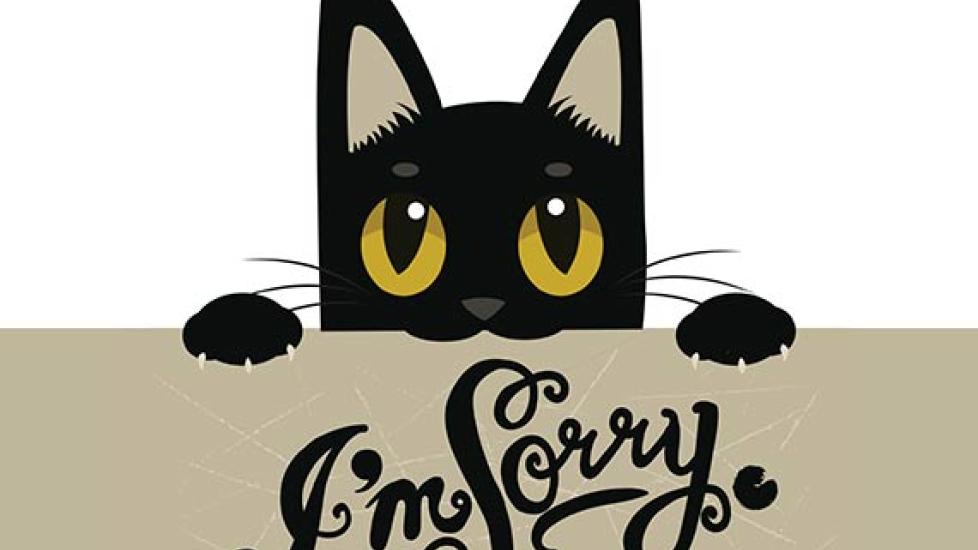Is it Okay to Apologize When You’re a Doctor?
“I’m sorry.”
Consider the magnitude of impact these two simple words can have.
Apologies, when uttered from a place of sincerity, are remarkably meaningful. They are capable of erasing negativity, clarifying misconceptions, and easing hurt feelings. They also convey understanding, solidarity, and compassion. When we are sincerely sorry, we are also truly humbled.
Recommended Pet Products
- Nutramax Proviable Probiotics & Prebiotics Digestive Health Supplement for Dogs & Cats, 160 count$89.98Chewy Price
- Fera Pets USDA Organic Pumpkin Plus Fiber Support for Dogs & Cats, 90 servings$34.95Chewy Price
- All Four Paws Comfy Cone E-Collar for Dogs & Cats, Black, Small$20.24Chewy Price
- Virbac Epi-Otic Advanced Ear Cleaner for Dogs & Cats, 4-fl oz bottle$13.19Chewy Price
For medical professionals, saying “I’m sorry” may have the opposite result. When a doctor offers words of apology there may be perception of culpability for an inappropriate action. It’s questioned as an omission of guilt. Are we looking for forgiveness for our inadequacies? Are we searching for absolution for our inability to heal or cure? Or worse, are we somehow admitting to negligence or neglect?
There are examples where expressions such as “I’m sorry” or “I apologize” were used as evidence of wrongdoing or guilt in a court in the context of medical liability/malpractice cases. Doctors and other members of a patient’s medical team have been penalized for declaring their regret. As a result, individuals are advised, if not ordered, to refrain from making such statements on the off chance the case in question ends up in court.
Fortunately, legislation is being structured to exclude expressions of sympathy, condolences, or apologies from being used against medical professionals in court. Proponents of these so-called "I'm sorry" laws believe that allowing medical professionals to make these statements can reduce medical liability/malpractice litigation. Currently, several states in the U.S. have pending laws to prevent apologies or sympathetic gestures uttered by medical professionals from being used against them in a legal forum.
For example, Massachusetts enacted a statute that
“provides that in any claim, complaint or civil action brought by or on behalf of a patient allegedly experiencing an unanticipated outcome of medical care, any and all statements, affirmations, gestures, activities or conduct expressing benevolence, regret, apology, sympathy, commiseration, condolence, compassion, mistake, error, or a general sense of concern which are made by a health care provider, facility or an employee or agent of a health care provider or facility, to the patient, a relative of the patient, or a representative of the patient and which relate to the unanticipated outcome shall be inadmissible as evidence in any judicial or administrative proceeding and shall not constitute an admission of liability or an admission against interest.”
From the perspective of a veterinarian actively working in the trenches, apologies are a routine part of my day. I frequently say “I’m sorry”; not to compensate for an inordinate amount of errors but rather as a means to offer a semblance of sympathy and understanding to owners who are often anxious, confused, and searching for kindness and hope.
I offer an apology to an owner after bearing unfortunate news or following the death of their pet. I say I’m sorry when a treatment plan has failed and a pet’s cancer has resurfaced or when lab work indicates that I need to alter my recommendations.
I offer regrets when I’m running behind in my schedule, when we’ve run out of a particular medication, or when a pet can’t have an ultrasound done that same day because the doctor who performs such exams is unavailable.
When I do make an error, I apologize for this as well. I’m not perfect and mistakes happen. My words are never stated lightly and I would never choose only admitting regret when it’s convenient for my own need.
When I say I’m sorry, I truly am sorry. There’s no alternative interpretation of my message. I’m not indicating anything more than a modest sense of compassion and care.
My idealistic soul desperately believes the majority of pet owners appreciate authenticity from their veterinarian over a lack of disclosure borne out of fear of legal retribution. The fact that laws are being developed to protect medical professionals suggests the opposite is the more factual scenario.
I urge you to consider which veterinarian you would prefer: the one who apologizes out of kindness or the one who remains silent out of fear?
Have you ever had an apology from your veterinarian (or other medical care giver)? How did you feel and respond?




